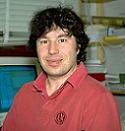MILEPOST
Machine Learning for Embedded Programs Optimisation
|
MILEPOST | |
Machine Learning for Embedded Programs Optimisation |
PARTNERS
The following organisations and people are involved in the MilePost project:
|
|
|
|
|
|
IBM Israel - Science and Technology Limited
|
|
INRIA (Institut National de Recherche en Informatique et en Automatique), France
|
|
Hugh Leather |
 |
 |
 |